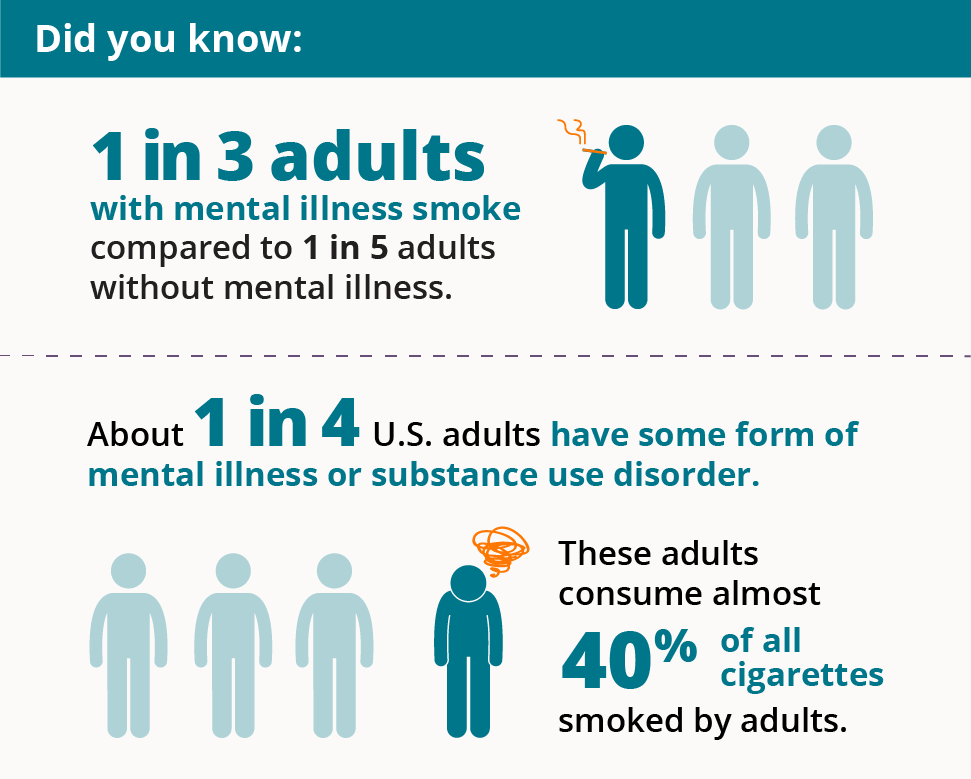For the foreseeable future, expanding mental health benefits is a top priority for many employers and health plans alike.
From stress to anxiety and depression, the list of mental health issues that employers and health plans strive to support is broad. Yet, there is one constant thread that pulls through, and that’s the complex interplay between smoking and mental health.
Did you know…
- 1 in 3 adults with mental illness smoke compared to 1 in 5 adults without mental illness.
- Approximately 1 in 4 U.S. adults have some form of mental illness or substance use disorder, and these adults consume almost 40% of all cigarettes smoked by adults.
- Tobacco smoke can interact with and inhibit the effectiveness of certain medications taken by mental health patients.
- People with mental illness die about 5 years earlier than those without these disorders, and many of these deaths are caused by smoking cigarettes.
So, if your benefit mix only addresses mental health but not tobacco use, your impact on wellbeing will fall short.
Impact of quitting tobacco on mental health
When people quit smoking, it’s widely known that it can have a dramatic effect on their physical health; however, it also improves a person’s mental health, too.
Research shows when they stop using tobacco, smokers with mental health issues experience:
- Decreases in anxiety, depression, and stress
- Improved positive mood and quality of life
But while smoking has a clear impact on physical and mental health, health care providers often do not address smoking with patients who have mental health conditions.
This is why it’s essential that employers and health plans offer and promote an easy-access quit-tobacco program, in addition to mental health benefits, to bridge this gap.
Industries with higher stress, high smoking rates
Workplace stress can be a key influence on an individual’s mental health, and certain industries see a higher prevalence of it. Manufacturing, retail, and food and beverage topped the list of industries, for example, in which employees felt the highest rates of work-related stress.
Key contributors to increased workplace stress include dissatisfaction over systems of recognition and reward, job insecurity, and, for those in retail and food beverage, low-wage living.
In the face of workplace stress, tobacco is often used as a coping strategy.
Not-so-coincidentally, tobacco use rates also run high in hospitality (30%), manufacturing (27%), and retail (24%). For employers in these industries, helping employees manage stress and supporting their overall mental health in tandem with encouraging their efforts to quit smoking is a must.
What our data shows on tobacco and mental health
At the EX Program, we understand the connection between tobacco and mental health. The internet is often the first place that tobacco users turn for help, and individuals with mental health conditions are no exception. About 40% of EX users in one study screened positive for anxiety or depression. And for smokers with mental health symptoms, engagement with EX improved their odds of quitting smoking by 30%.
The study referenced above illustrates that engagement with an evidence-based digital cessation program can be useful for smokers with mental health issues.
At the EX Program, for example, we provide dedicated content to help participants with mental health issues understand how quit medications may affect them and the impact of quitting tobacco on their mental health.
EX also offers peer support through our online community, as you’ll see in posts such as this one, “I Can’t Believe It’s Been 46 Days.” Plus, our EX Coaches are specifically trained to engage participants regardless of the challenges they bring to the quitting journey.
Going for the double win
For the foreseeable future, employers and health plans will expand mental health benefits and look for other ways to improve wellbeing—not only to contain costs but because it’s the right thing to do when you care about your people.
However, to effectively address the entire spectrum of health, benefits must provide opportunities for individuals to concentrate on their mental health as well as quitting smoking—not one or the other.
For more information on the connection between tobacco and mental health, see 4 Myths about Vaping, Smoking and Mental Health and our Tip Sheet: How to Help Employees with “Stress Smoking”





